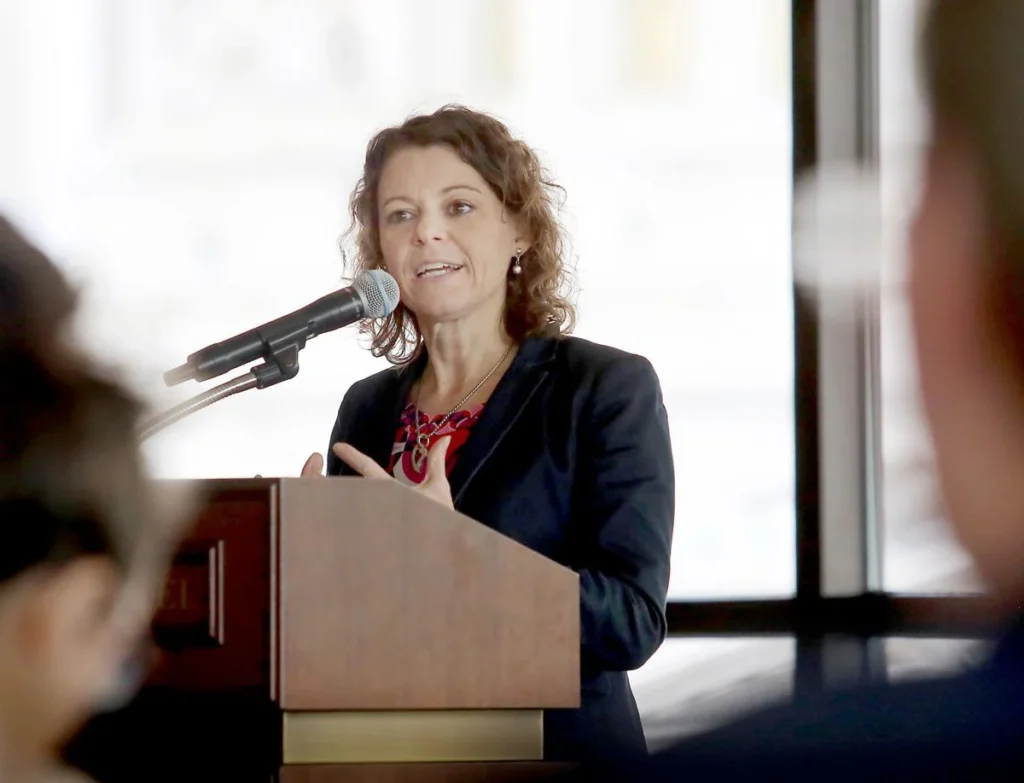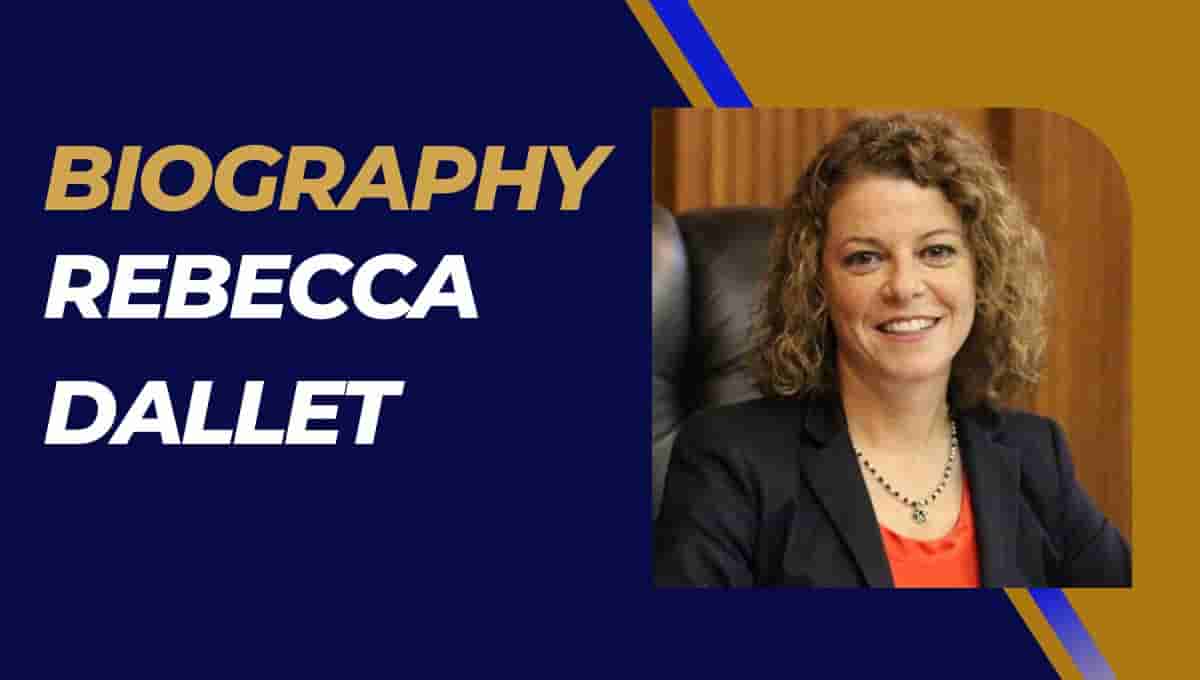Rebecca Dallet Political Party, Wikipedia
Rebecca Dallet Political Party, Wikipedia – Rebecca Frank Dallet, born on July 15, 1969, has carved a remarkable path in American law, ultimately becoming a justice on the Wisconsin Supreme Court. Her journey to this prestigious position has been marked by dedication, legal expertise, and a commitment to justice.

Rebecca Dallet Early Life and Career
Rebecca Dallet’s early years were spent in Ohio, where she attended Shaker Heights High School. After completing her high school education, she pursued a Bachelor of Arts degree in Economics at Ohio State University. Eager to deepen her knowledge and passion for the law, she continued her academic journey at Case Western Reserve University School of Law, where she earned her Juris Doctor (J.D.) degree.
Upon graduating from law school, Rebecca Dallet embarked on her legal career as a Law Clerk for a U.S. magistrate judge. This role allowed her to gain valuable insights into the workings of the legal system. She then took on the role of an Assistant United States Attorney, where she worked to uphold the law and protect the rights of the people. Her dedication and legal acumen were evident as she prosecuted cases and contributed to the pursuit of justice.
Dallet’s commitment to public service led her to serve as an assistant district attorney with the Milwaukee County District Attorney’s Office. In this role, she continued to make a positive impact on her community by working on important legal matters.
Additionally, Rebecca Dallet’s passion for the law extended to education, as she served as an adjunct professor of law at Marquette University Law School. Her willingness to share her knowledge and mentor future legal professionals highlights her dedication to the legal field.
A Career on the Bench
Rebecca Dallet’s career took a significant turn when she was elected as a Judge for the Milwaukee County Circuit Court in 2008. Her election was a testament to her legal expertise and her commitment to justice. She was re-elected to this position in 2014, demonstrating the trust and confidence the community placed in her.
Before her election as a judge, Dallet took on leadership roles within the legal community. She served as President of the Milwaukee Trial Judges Association, where she played a key role in shaping the local legal landscape. Additionally, she held the position of Secretary of the Association of Women Lawyers, further highlighting her commitment to promoting diversity and inclusion within the legal profession.
Rebecca Dallet’s dedication to her work was underscored when she became the first female presiding court commissioner in Milwaukee County’s history. This achievement marked a significant milestone in her career and showcased her trailblazing spirit.
Challenges in the Wisconsin Supreme Court
Rebecca Dallet’s career reached new heights when she assumed the role of a justice on the Wisconsin Supreme Court. Her election to this esteemed position was a testament to her legal expertise and commitment to justice. However, her time on the court was not without challenges.
One notable incident detailed in the article highlights a chaotic moment in the Wisconsin Supreme Court’s history. The court’s liberal majority voted to update rules that would solidify its control over court business. In the midst of this, a typo in the documents caused tension between the justices.

Chief Justice Annette Ziegler, a conservative, expressed her frustration over the error and asked for a corrected version of the documents. The situation escalated, leading to accusations of secret meetings and attempts to undermine the chief justice’s authority.
Despite the initial conflict, Rebecca Dallet, in her capacity as a justice, expressed optimism about working together to address court business. However, Chief Justice Ziegler firmly rejected the idea, citing concerns about the legitimacy of certain actions taken by the liberal majority.
This incident shed light on the power struggle between the court’s liberal and conservative justices. It also revealed the complexities of decision-making and collaboration within the highest court in Wisconsin.
Rebecca Dallet Changes and Controversies
During their initial week in control, the liberal justices made significant changes, including the firing of a top court official and the alteration of court rules to shift power away from the chief justice to a three-judge liberal committee. These changes were met with strong objections from their conservative colleagues, who questioned the procedures and transparency of the decisions.
Justice Brian Hagedorn, a conservative, expressed concerns about the proper procedures not being followed, particularly the lack of a public hearing on the changes. Chief Justice Ziegler advocated for a public discussion on the matter, further emphasizing the disagreements within the court.
The situation also revealed challenges in the transition of power, with state officials struggling to locate Justice Janet Protasiewicz’s oath of office despite her involvement in court matters.
The release of emails and documents provided by conservative members of the court shed light on the chaotic nature of the court’s first week under liberal rule. It exposed internal disagreements and power struggles that had been brewing for months, adding a layer of complexity to the court’s dynamics.
Personnel Changes Spark Controversy
One significant point of contention was the firing of Director of State Courts Randy Koschnick, which occurred shortly before the liberal justices took control of the court. The decision to terminate Koschnick’s employment deeply divided the court, with conservative members deeming it procedurally flawed.
The emails released as part of the article revealed that the liberal justices had planned to remove Koschnick from his position as early as June. The decision was met with criticism, and Chief Justice Ziegler called it flawed procedurally, legally, and on its merits.
The controversy surrounding Koschnick’s dismissal led to a public feud between the liberal and conservative justices. It raised questions about the transparency of the decision-making process and the adherence to established procedures.
Ongoing Disagreements
The emails exchanged among the justices also highlighted ongoing disagreements regarding the hiring process for court personnel. Concerns were raised about the transparency and inclusivity of the hiring process, with some justices expressing reservations about the selection of candidates.
Justice Dallet defended the actions of the liberal justices, citing a commitment to making the court more open and inclusive. However, this stance was met with criticism from her conservative colleagues, who questioned the consistency of the hiring process and the lack of involvement from all justices.
The dispute over personnel changes and hiring procedures further deepened the divisions within the court, with both liberal and conservative justices advocating for their respective positions.
Missing Oath Raises Questions
One peculiar incident detailed in the emails was the confusion surrounding Justice Janet Protasiewicz’s oath of office. Despite her involvement in court matters, state officials struggled to locate the document, leading to questions about the timing of her oath.

The email exchange revealed that Justice Protasiewicz had taken her oath a week before, and the necessary paperwork had been filed. However, the delay in confirming this information raised eyebrows and added to the complexity of the court’s first week under liberal control.
Conclusion
Rebecca Frank Dallet’s journey from Ohio to the Wisconsin Supreme Court has been marked by dedication, legal expertise, and a commitment to justice. Her career, which began as a law clerk and prosecutor, eventually led her to the position of a circuit court judge and, ultimately, a justice on the highest court in Wisconsin.
The article sheds light on the challenges and controversies that have arisen within the Wisconsin Supreme Court, particularly during the transition of power from conservative to liberal justices. The internal disagreements and disputes over personnel changes and decision-making processes underscore the complexities of serving on the state’s highest court.
Rebecca Dallet’s story serves as a testament to the importance of dedication and commitment in the legal profession. It also highlights the challenges and responsibilities that come with serving on a court tasked with upholding justice and the rule of law.
Who is Rebecca Frank Dallet, and what is her background?
Rebecca Frank Dallet is an American lawyer and a justice on the Wisconsin Supreme Court. She grew up in Ohio, earned a B.A. in Economics from Ohio State University, and a J.D. from Case Western Reserve University School of Law. She has served as a Law Clerk, Assistant United States Attorney, and assistant district attorney, among other roles.
What positions has Rebecca Dallet held in the legal community before becoming a judge?
Before becoming a judge, Rebecca Dallet held various positions, including President of the Milwaukee Trial Judges Association, Secretary of the Association of Women Lawyers, and she served as an adjunct professor of law at Marquette University Law School.
What challenges did the Wisconsin Supreme Court face during Rebecca Dallet’s time on the bench?
During her time on the court, there were conflicts and controversies, including disagreements between liberal and conservative justices. These disputes revolved around issues such as rule changes, personnel changes, and the balance of power within the court.
Read More Bio








